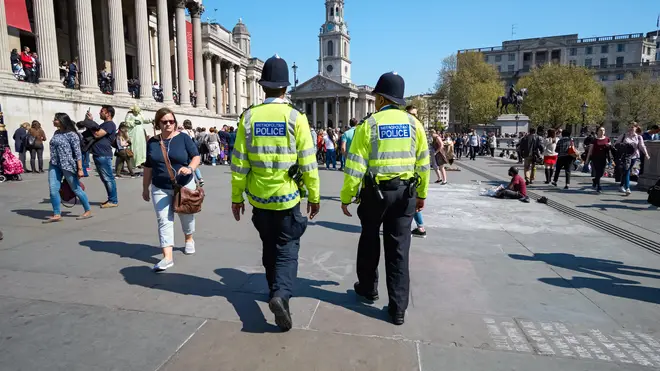
Ian Payne 4am - 7am
26 October 2021, 00:28 | Updated: 26 October 2021, 06:39

Shocking figures have revealed a "sharp rise" in the number of police officers and staff facing disciplinary action over allegations they abused their position for sexual purposes, according to a watchdog.
Figures from the Independent Office for Police Conduct (IOPC) showed there were 70 IOPC probes of police officers and staff over allegations of abuse of position for a sexual purpose (APSP) last year, opposed to 10 in 2016.
Between April 2018 and March 2021, 66 faced misconduct proceedings after being investigated.
Some 42 of these were in the last year alone and misconduct was proven in 63 of the cases.
The IOPC has warned that such individuals have "no place in policing and will be found out".
Of the 52 who faced gross misconduct proceedings - for the most severe allegations - 73% (38) are no longer serving and were barred from working in policing again.
Read more: Killer cop to die behind bars: Sarah Everard's parents say the world is a 'safer place'
Read more: BTP fights decision to let cop who harassed lone jogger keep his job

PM urges public to trust the police after Sarah Everard’s murder
Most of these (29) were sacked and the remaining nine would have been if they had not resigned already.
In that time, seven police officers or staff were also prosecuted for criminal offences, leading to six convictions of which three resulted in an immediate custodial sentence, the IOPC said.
The watchdog put the rise in disciplinary action down to an increased effort to sanction on those responsible as heightened awareness of the problem led to more cases being reported.
It was also suggested the rise may signal some "pent-up demand" as it takes time for cases to work through the system.
The data does not provide a complete picture of all action being taken as forces can also carry out their own investigations.
IOPC deputy director general Claire Bassett described the behaviour as an "appalling abuse of the public's trust".
"Recent events we have seen, including the horrific actions of Wayne Couzens, remind us that policing must act to root out this kind of behaviour once and for all.
"The police are there to help them, not exploit them."
Read more: Officer sacked for pursuing sexual relationship with domestic abuse victim
She said the numbers showed there would be "consequences" for this behaviour.
"What these numbers tell us is that this is a very serious form of corruption, but also those police officers that do this will get caught and will suffer significant sanction for that if they do.
"Those that do indulge in this are highly likely to lose their jobs and they may well face criminal sanctions and custodial sentences as a result.
"It's really important that there is a culture in policing that has a zero tolerance of any form of behaviour that is insulting, is sexist, is homophobic, there is just no place for that in modern policing.
"We want to see forces sending out that message, we want to see individual officers calling out their fellow officers, which we do see but we'd like to see more of that, and we'd like to see forces really emphasising to officers that this behaviour is wrong."
Changes made in 2017 after the body's predecessor - the Independent Police Complaints Commission - found some forces were not treating APSP cases as a form of corruption, led to a "significant and sustained rise in the number of referrals and independent investigations", the IOPC said.
Now, APSP is the "single largest form of police corruption" the IOPC deals with, accounting for around a quarter of all corruption referrals last year, and almost 60% of such investigations.
The National Police Chiefs' Council lead for counter corruption, Chief Constable Lauren Poultney, said: "The figures released by the Independent Office for Police Conduct will cause concern. I want to emphasise that we are working hard to root out those who are attracted to policing for the wrong reasons."